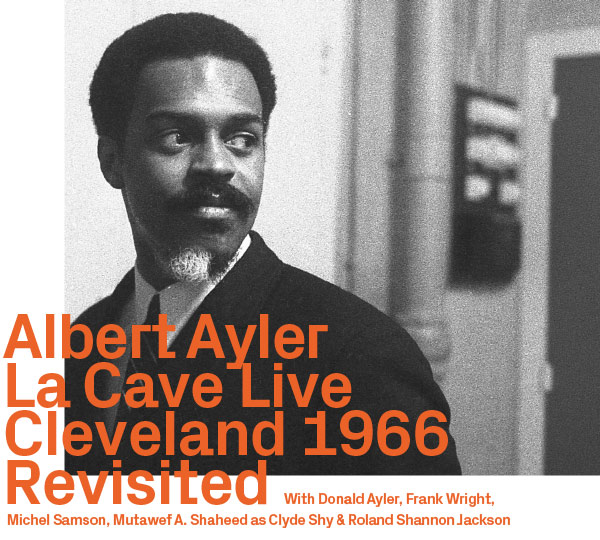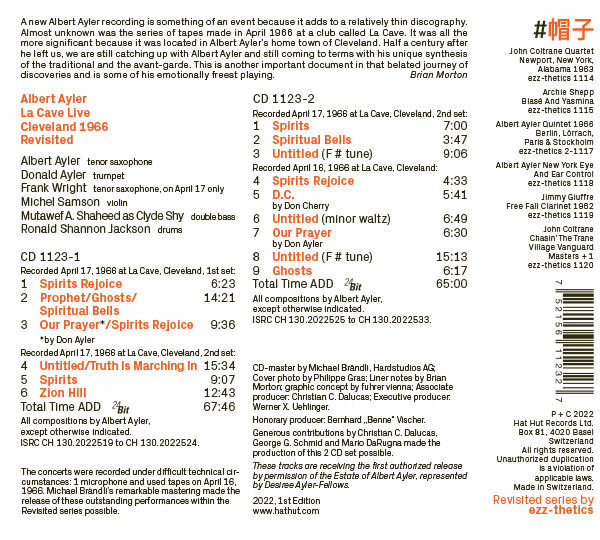Startseite › Foren › Über Bands, Solokünstler und Genres › Eine Frage des Stils › Blue Note – das Jazzforum › Albert Ayler
-
AutorBeiträge
-
In Ergänzung zum seinem (mir unbekannten) Erinnerungs-Band von 2020 gibt es online zwei weitere Texte/Kapitel von Eddie Prevost – das eine ein interessanter Blick hinter die Kulissen bei Aylers von der BBC „gelöschtem“ 1966er Auftritt an der London School of Economics (es ist eben gar nicht klar, ob es überhaupt was zum Löschen gab – lest nach, lohnt sich!). Weil der Name von Evan Parker darin fällt, hat er auch aktuellem Anlass auch noch ein P.S. dazu schreiben müssen.
https://matchlessrecordings.com/book/uncommon-music-common-man
--
"Don't play what the public want. You play what you want and let the public pick up on what you doin' -- even if it take them fifteen, twenty years." (Thelonious Monk) | Meine Sendungen auf Radio StoneFM: gypsy goes jazz, #164: Neuheiten aus dem Archiv, 10.6., 22:00 | Slow Drive to South Africa, #8: tba | No Problem Saloon, #30: tbaHighlights von Rolling-Stone.deQueen: Darum war ihr Live-Aid-Konzert nicht wirklich spektakulär
25 Jahre „Parachutes“ von Coldplay: Traurige Zuversicht
Paul McCartney kostete „Wetten dass..?“-Moderator Wolfgang Lippert den Job
Xavier Naidoo: Das „Ich bin Rassist“-Interview in voller Länge
Die 75 schönsten Hochzeitslieder – für Kirche, Standesamt und Feier
Jim Morrison: Waidwunder Crooner und animalischer Eroberer
Werbungdanke! weiss gar nicht, ob wir das schon hatten, aber diese tolle Dokumentation ueber Ayler steht zur Zeit auf youtube… auch empfehlenswert… allein schon um wegen den ganzen Zeitzeugen wie seinem Vater, seinem Bruder, Sunny Murray (der erzaehlt, dass Aylers Art zu reden ihn an seine Mutter erinnert) und um Aylers Zitate in Kontext gesetzt zu hoeren…
--
.
Donald Ayler würde heute 79 Jahre alt.
--
"Don't play what the public want. You play what you want and let the public pick up on what you doin' -- even if it take them fifteen, twenty years." (Thelonious Monk) | Meine Sendungen auf Radio StoneFM: gypsy goes jazz, #164: Neuheiten aus dem Archiv, 10.6., 22:00 | Slow Drive to South Africa, #8: tba | No Problem Saloon, #30: tbain der „Revisited“-Reihe von ezz-thetics kommt grad das Filetstück der „Holy Ghost“-Box einzeln heraus:


auch in digitaler Form auf Bandcamp:
https://ezz-thetics.bandcamp.com/album/la-cave-live-cleveland-1966-revisited
--
"Don't play what the public want. You play what you want and let the public pick up on what you doin' -- even if it take them fifteen, twenty years." (Thelonious Monk) | Meine Sendungen auf Radio StoneFM: gypsy goes jazz, #164: Neuheiten aus dem Archiv, 10.6., 22:00 | Slow Drive to South Africa, #8: tba | No Problem Saloon, #30: tba

Richard Brody im New Yorker über das neue Ayler-Set auf Elemental – ein längerer Auszug:
These albums also featured lyrics and vocals by Mary Parks, a.k.a. Mary Maria—Ayler’s partner, his manager, and, ultimately, his spouse. In the somewhat jerry-rigged studio settings, they, too, seemed like grafts rather than essential elements of Ayler’s music. But the “Revelations” set proves that Parks’s work—not only her lyrics but her musical inventions—were vastly inspiring to Ayler. The studio context of commercial recordings didn’t favor their personal and musical connection, but the two concerts in Saint-Paul-de-Vence, France, in July, 1970—which were recorded for French radio—did so. The first of the two concerts, on the 25th, featured a quartet that included Ayler, Parks, the bassist Steve Tintweiss, and the drummer Allen Blairman. The pianist Call Cobbs missed his flight and was present only for the second date. As a result, the first July performance put Ayler and Parks together in the front line; this gave Parks’s compositions and her styles more prominence and offered the musical interaction between the two of them ample space and time. It showed that Ayler indeed had a new, late manner, undisplayed in his commercial releases, which brought together a wide range of influences and ideas, styles and methods, and of which Parks’s contributions were the core. The collaboration held great promise for a vast musical reimagination to come, but it also flourished, with irrepressible energy, in this pair of concerts (which the “Revelations” set presents as they were originally performed, in strict chronological order).
The opening number, “Music Is the Healing Force of the Universe,” starts with Ayler playing unaccompanied, adding his own cosmic vibrations to the raucous swagger of a bar-walking R. & B. saxophonist. Parks then recites, in a theatrical Sprechstimme, her lyrics (“Music causes all bad vibrations to fade away; it makes one want to love instead of hate”), joined by Ayler’s tender obbligatos. There was always an element of rapturous love in Ayler’s music, but, here, it has a direct, personal intimacy that’s manifest in its tone. He also offers some wondrously wild saxophone shrieking, and then Parks recites some more, but, when Ayler returns, it’s not with wildness but with a simple melody that he repeats and reworks with an obsessive, incantatory insistence.
The musical variety of the concert is astonishing. Parks sings in tongues, to Ayler’s accompaniment in the frenzied high register; Ayler sings in tongues and, building on the same melodies, solos on soprano sax with ferocious, frantic, sky-scaling shrieks. Parks sings to a catchy calypso in the vein of Sonny Rollins’s “St. Thomas.” She, too, plays soprano sax on many pieces with an altogether distinctive, deep, overtone-laden sound. Their saxophone duets are among the highlights of the set; Parks is a less experienced, less studied saxophonist, but her solos are both fiercely expressive on their own and part of a musical dialogue with Ayler that has a palpable unity of purpose. After one song by Parks, Ayler segues—with Blairman whipping up a bouncy storm behind him—into a high-stepping, fast-motion march; a ballad-like, preaching peroration; and a strutting, dance-like coda, sending a clear message to anyone who doubts what it means for free jazz to swing. Elsewhere, Ayler, playing tenor, and Parks, on soprano, play with such fury that Blairman and Tintweiss are yelling, and it seems as if the dome under which the show is performed will be blown apart by their energy.
Throughout these two concerts, Ayler gathers and transfigures a vast range of musical traditions that are foregrounded all the more prominently in the second concert, on July 27th. There, Cobbs, a far more traditional musician, collaborates with Ayler vigorously, and Parks’s contribution to the group is subordinated. Cobbs had a background in swing and a job playing in church (Ayler recorded an album of spirituals, “Goin’ Home,” with him in 1964). Popular moods and tones are more dominant on this recording, with Cobbs’s rolling chords meshing with a backbeat, a rollicking march, and jaunty blues. At times, Ayler shifts his melodic delight into whirling, obsessively repetitive, trance-like incantations, but, when he takes off into his most furious extremes, the pianist seems out of place. Nonetheless, Parks’s involvement is vital to this concert, too: on numbers she sings with Ayler’s obbligatos, the collaboration displays a tenderness recalling the duets of Billie Holiday and Lester Young. On the extraordinary “Holy Holy,” a speedy tune reminiscent of Coltrane’s “Impressions,” Parks’s soprano-sax solo has the resonant depth of a tenor; she and Ayler play together in furious, free-rhythm joint improvisations that resolve to something like bebop with a heavy blues edge.
Den ganzen Text gibt es hier:
https://www.newyorker.com/culture/the-front-row/the-jubilant-glory-of-albert-aylers-revelations--
"Don't play what the public want. You play what you want and let the public pick up on what you doin' -- even if it take them fifteen, twenty years." (Thelonious Monk) | Meine Sendungen auf Radio StoneFM: gypsy goes jazz, #164: Neuheiten aus dem Archiv, 10.6., 22:00 | Slow Drive to South Africa, #8: tba | No Problem Saloon, #30: tbaAlbert Ayler 1966 in Bordeaux
--
"Don't play what the public want. You play what you want and let the public pick up on what you doin' -- even if it take them fifteen, twenty years." (Thelonious Monk) | Meine Sendungen auf Radio StoneFM: gypsy goes jazz, #164: Neuheiten aus dem Archiv, 10.6., 22:00 | Slow Drive to South Africa, #8: tba | No Problem Saloon, #30: tba -
Schlagwörter: Albert Ayler, Avantgarde, Donald Ayler, Free Jazz, Jazz
Du musst angemeldet sein, um auf dieses Thema antworten zu können.